| Listing 1 - 10 of 12 | << page >> |
Sort by
|
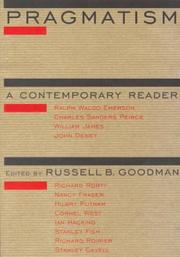
ISBN: 0415909104 0415909090 9781003061502 1003061508 9781000101010 1000101010 9781000117967 1000117960 9781000143324 1000143325 9780415909099 9780415909105 Year: 1995 Publisher: New York, N.Y. Routledge
Abstract | Keywords | Export | Availability | Bookmark
 Loading...
Loading...Choose an application
- Reference Manager
- EndNote
- RefWorks (Direct export to RefWorks)
Philosophy --- Pragmatism. --- Pragmatism --- Idealism --- Knowledge, Theory of --- Philosophy, Modern --- Positivism --- Realism --- Utilitarianism --- Experience --- Reality --- Truth
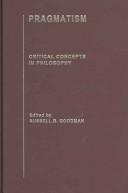
ISBN: 0415288452 0415288460 0415288479 0415288487 0415288495 Year: 2005 Volume: *7 Publisher: London ; New York Routledge
Abstract | Keywords | Export | Availability | Bookmark
 Loading...
Loading...Choose an application
- Reference Manager
- EndNote
- RefWorks (Direct export to RefWorks)
Pragmatism --- Idealism --- Knowledge, Theory of --- Philosophy --- Philosophy, Modern --- Positivism --- Realism --- Utilitarianism --- Experience --- Reality --- Truth
Book
ISBN: 9780199577545 0199577544 019180262X Year: 2015 Publisher: Oxford Oxford University Press
Abstract | Keywords | Export | Availability | Bookmark
 Loading...
Loading...Choose an application
- Reference Manager
- EndNote
- RefWorks (Direct export to RefWorks)
Russell B. Goodman tells the story of the development of philosophy in America from the mid-18th century to the late 19th century. The key figures in this story, Jonathan Edwards, Benjamin Franklin, Thomas Jefferson, the writers of The Federalist, and the romantics (or 'transcendentalists') Emerson and Thoreau, were not professors but men of the world, whose deep formative influence on American thought brought philosophy together with religion, politics, and literature. Goodman considers their work in relation to the philosophers and other thinkers they found important: the deism of John Toland and Matthew Tindal, the moral sense theories of Francis Hutcheson, Adam Smith, and David Hume, the political and religious philosophy of John Locke, the romanticism of William Wordsworth and Samuel Taylor Coleridge, and the transcendental idealism of Immanuel Kant.--
Philosophy, American --- Philosophie américaine --- Edwards, Jonathan, --- Emerson, Ralph Waldo, --- Franklin, Benjamin, --- Jefferson, Thomas, --- Thoreau, Henry David, --- Philosophie --- Pragmatisme (philosophie) --- Philosophie américaine --- Political philosophy. Social philosophy --- History of philosophy --- Religious studies --- Literature --- anno 1800-1899 --- anno 1700-1799 --- United States --- Jefferson, Thomas --- Franklin, Benjamin --- Thoreau, Henry David --- Edwards, Jonathan --- United States of America
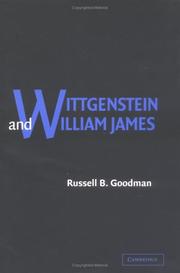
ISBN: 0521813158 0521038871 1107125677 0511176694 0511042396 0511157584 0511304595 0511498136 128043404X 051104545X 9780521813150 9780511042393 9780511045455 9780511498138 9781280434044 9786610434046 6610434042 9780521038874 9780511176692 9780511157585 9780511304590 9781107125674 9780521038874 Year: 2002 Publisher: Cambridge (Mass.): Cambridge university press,
Abstract | Keywords | Export | Availability | Bookmark
 Loading...
Loading...Choose an application
- Reference Manager
- EndNote
- RefWorks (Direct export to RefWorks)
This 2002 book explores Wittgenstein's long engagement with the work of the pragmatist William James. In contrast to previous discussions Russell Goodman argues that James exerted a distinctive and pervasive positive influence on Wittgenstein's thought. For example, the book shows that the two philosophers share commitments to anti-foundationalism, to the description of the concrete details of human experience, to the priority of practice over intellect, and to the importance of religion in understanding human life. Considering in detail what Wittgenstein learnt from his reading of Principles of Psychology and Varieties of Religious Experience the author provides considerable evidence for Wittgenstein's claim that he is saying 'something that sounds like pragmatism'. This provocative account of the convergence in the thinking of two major philosophers usually considered as members of discrete traditions will be eagerly sought by students of Wittgenstein, William James, pragmatism and the history of twentieth-century philosophy.
Wittgenstein, Ludwig, --- James, William, --- James, William --- Wittgenstein, Ludwig --- Wei-tʻe-ken-ssu-tʻan, --- Wei-tʻe-ken-ssu-tʻan, Lu-te-wei-hsi, --- Wittgenstein, L. --- Vitgenshteĭn, L., --- Wei-ken-ssu-tʻan, --- Pitʻŭgensyutʻain, --- Vitgenshteĭn, Li︠u︡dvig, --- Weitegenshitan, --- Wittgenstein, Ludovicus, --- Vitgenshtaĭn, Ludvig, --- ויטגנשטיין, לודוויג --- 维特根斯坦, --- Dzhems, Uilʹi︠a︡m, --- Jaymz, Vīlyām, --- جىمز، وىلىام --- Wittgenstein, Ludwig Josef Johann, --- Arts and Humanities --- Philosophy --- Wittgenstein, Ludwig, - 1889-1951 --- James, William, - 1842-1910
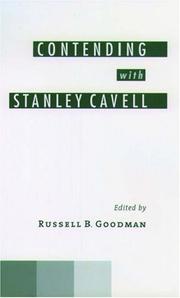
ISBN: 1280704438 019534653X 1423722507 9781423722502 9780195175684 0195175689 0197730175 0190291893 Year: 2005 Publisher: New York (N.Y.) Oxford university press
Abstract | Keywords | Export | Availability | Bookmark
 Loading...
Loading...Choose an application
- Reference Manager
- EndNote
- RefWorks (Direct export to RefWorks)
Stanley Cavell has been a brilliant, idiosyncratic, & controversial presence in American philosophy, literary criticism & cultural studies for years. This collection showcases his new work.
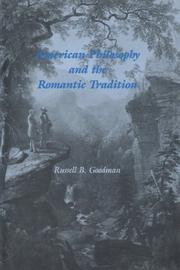
ISBN: 0521394430 9780521394437 9780521067652 0521067650 0511895585 Year: 1990 Publisher: Cambridge : Cambridge University Press,
Abstract | Keywords | Export | Availability | Bookmark
 Loading...
Loading...Choose an application
- Reference Manager
- EndNote
- RefWorks (Direct export to RefWorks)
Professional philosophers have tended either to shrug off American philosophy as negligible or derivative or to date American philosophy from the work of twentieth-century analytical positivists such as Quine. Russell Goodman expands on the revisionist position developed by Stanley Cavell, that the most interesting strain of American thought proceeds not from Puritan theology or from empirical science but from a peculiarly American kind of Romanticism. This insight leads Goodman, through Cavell, back to Emerson and Thoreau and thence to William James and John Dewey, as they assimilated to American circumstances and intellectual habits the currents of European thought from Kant to Wittgenstein.
Philosophy, American. --- Romanticism --- Emerson, Ralph Waldo, --- James, William, --- Dewey, John, --- Philosophy. --- Arts and Humanities --- Literature --- American philosophy --- Tu-wei, --- Tu-wei, Yüeh-han, --- Dyui, --- Dʹi︠u︡i, Dzhon, --- Dyuʼi, G'on, --- Дьюи, Джон, --- ديوى، جون، --- 杜威, --- Dīvīy, Jān, --- ديويي، جان --- Dīwʼī, Jān, --- Dīwiʼī, Jān, --- ديوئى، جان --- Diyūʼī, Jān, --- Dyūwi, Jon, --- Dyūi, Jon, --- デューウィジョン, --- デューイジョン, --- ジョン・デューウィ, --- ジョン・デューイ, --- Dzhems, Uilʹi︠a︡m, --- Jaymz, Vīlyām, --- جىمز، وىلىام --- Imarsana, Rāfa Vālḍō, --- Emerson, R. W. --- Emerson, Waldo, --- Emerson, R. Waldo --- Ėmerson, Ralʹf Uoldo, --- Ai-mo-sheng, --- Emarsan̲, --- אמרסון, רלף ולדו, --- עמערסון, ראלף וואלדא,
Multi
ISBN: 9780511895586 9780521394437 9780521067652 Year: 1990 Publisher: Cambridge Cambridge University Press
Abstract | Keywords | Export | Availability | Bookmark
 Loading...
Loading...Choose an application
- Reference Manager
- EndNote
- RefWorks (Direct export to RefWorks)
Philosophy --- Dewey, John --- anno 1800-1899 --- United States of America
Book

ISBN: 9780823292639 Year: 2022 Publisher: New York, NY
Abstract | Keywords | Export | Availability | Bookmark
 Loading...
Loading...Choose an application
- Reference Manager
- EndNote
- RefWorks (Direct export to RefWorks)
Multi

ISBN: 9780823292639 9780823234745 Year: 2022 Publisher: New York, N.Y. Fordham University Press
Abstract | Keywords | Export | Availability | Bookmark
 Loading...
Loading...Choose an application
- Reference Manager
- EndNote
- RefWorks (Direct export to RefWorks)
Book

ISBN: 9780823293391 Year: 2022 Publisher: New York, NY
Abstract | Keywords | Export | Availability | Bookmark
 Loading...
Loading...Choose an application
- Reference Manager
- EndNote
- RefWorks (Direct export to RefWorks)
| Listing 1 - 10 of 12 | << page >> |
Sort by
|

 Search
Search Feedback
Feedback About UniCat
About UniCat  Help
Help News
News